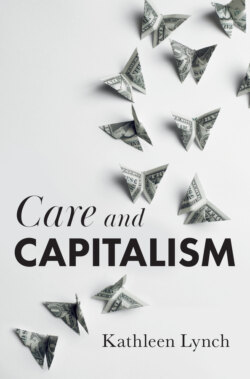Читать книгу Care and Capitalism - Kathleen Lynch - Страница 45
Notes
Оглавление1 1 Scholz (2009: 129) summarizes this position very well: ‘the symbolic order of the commodity-producing patriarchy is characterized by the following assumptions: politics and economics are associated with masculinity; male sexuality, for example, is generally described as individualized, aggressive, or violent, while women often function as pure bodies. The man is therefore regarded as human, man of intellect, and body transcendent, while women are reduced to non-human status, to the body. War carries a masculine connotation, while women are seen as peaceful, passive, devoid of will and spirit. Men must strive for honor, bravery, and immortalizing actions. Men are thought of as heroes and capable of great deeds, which requires them to productively subjugate nature. Men stand at all times in competition with others. Women are responsible for the care for the individual as well as for humanity itself. Yet their actions remain socially undervalued and forgotten in the process of the development of theory, while their sexualization is the source of women’s subordination to men and underwrites their social marginalization.’
2 2 That use value could be enumerated if there was a political commitment to do so (Waring 2004).
3 3 The demand for carers is growing in rich countries with ageing populations, such as Japan, where there were already 1.71 million paid carers in 2014 (Miyazaki 2019). In December 2018, Japan passed amendments to the Immigration Control and Refugee Recognition Act that took effect in April 2019. This allowed for the immigration of an estimated 60,000 carers from 2019 to 2223, the largest single type of migrant worker being admitted under the new immigration laws. And it is likely that a very large proportion of those will be women, given the overlap between care work and gender globally.
4 4 Of all nurses immigrating to the UK between 1998 and 2003, the vast majority were from the Philippines (17,329); this was more than three times the number from South Africa and four times the number from India (Brush and Vasupuram 2006).
5 5 Officially, there were 163.8 million migrants globally in 2017, of whom 58 per cent were men and 42 per cent were women (IOM 2020: 34).
6 6 And when they migrate due to internal displacement and war, seeking asylum and refuge in other countries, while both women and men are exploited through forced labour, it is women and girls who are most often subject to trafficking for sexual exploitation (UNHCR 2020).
7 7 https://www.ilo.org/dyn/normlex/en/f?p=NORMLEXPUB:12100:0::NO::P12100_ILO_CODE:C189.
8 8 An imprimatur from the Catholic Church was sought (and given) for much of the exploitation and enslavement that followed not only from the Crusades, but from the colonization of Africa and the Americas. A refusal to become Christian was justification for enslavement (Patel and Moore 2018: 92–5).
9 9 https://www.statista.com/statistics/778577/billionaires-gender-distribution.
10 10 The data for this study came from the 2003–7 American Time Use Survey (ATUS), a nationally representative cross-sectional time use survey organized by the US Bureau of Labor Statistics. Men’s time spent on caring for children alone, attending to their physical needs and managing their care rises when wives are working full time (Raley, Bianchi and Wang 2012: table 6). The survey, covering households with children under thirteen years, involved 6,572 fathers and 7,376 mothers.
11 11 https://ec.europa.eu/eurostat/statistics-explained/index.php?title=How_do_women_and_men_use_their_time_-_statistics&oldid=463738#.
12 12 https://www.pwc.com/gx/en/news-room/press-releases/2021/women-in-work-index-2021.html.
13 13 The caveat is mine.
14 14 In her book Object Lessons (1996) Eavan Boland meditates on how the experiences of women qua women, such as caring for children, were not defined as fit subjects for poetry. While Irish women could write poetry, they were expected to take their subject matter from men’s handbook. Through her life’s work, Boland created a space, for the first time within modern Ireland, where being a woman and a poet was no longer a contradiction in terms.
15 15 The vernacular terms reflect their association with disgust and abjection: shit, pee, sputum and vomit.
16 16 ‘Well it’s basically twenty-four hours a day, seven days a week. I mean you are on call all the time, … you cannot leave them’ (Valerie, a daughter, who had taken leave from her job to care for both parents, in Lynch, Baker and Lyons 2009: 59–60).
17 17 ‘I think that being a mother is the most thankless task in the world … because it’s taken for granted particularly in Ireland in terms of the whole culture and the whole thing. That is just the way it is. It’s taken for granted. Nobody really cares at the end of the day … Society doesn’t appreciate it; the Government doesn’t appreciate it either’ (Paula, employed full-time, separated mother of four children, of whom three were adults and one school-going, in Lynch, Baker and Lyons 2009: 80–1).
18 18 ‘We [carers] don’t exist, we get the usual pat on the head at election time, [we are] patronised. We don’t exist. As long as you are prepared to do it, they will wring their hands and say you have done a great job and leave it to that’ (Tom, single man, caring full-time for his father, in Lynch, Baker and Lyons 2009: 82).
